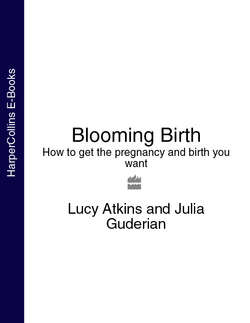Читать книгу Blooming Birth: How to get the pregnancy and birth you want - Lucy Atkins - Страница 44
It could happen: specific pregnancy fears and what to do about them Miscarriage
ОглавлениеA survey carried out by The Miscarriage Association found that nearly half the women who miscarried said they didn’t feel well informed about what was happening to them. Only 29 per cent felt well cared for emotionally. Many women who miscarry say books provided little or no information about it in advance. Many feel grief, depression, sadness, anger and loneliness after a miscarriage. This is why we’re giving you some basic facts about miscarriage. It does not mean you should expect to have one. But it may help you to cope if you do (and also to be sensitive to women you know who have had one).
MISCARRIAGE: SOME BASIC FACTS
More than one in five pregnancies end in miscarriage.
Most women only miscarry once.
Most miscarriages happen in the first 12 weeks of pregnancy, usually in the first eight weeks.
Even when a baby stops developing at six or eight weeks, it may take some time before the physical process of miscarriage starts.
Late miscarriage, where the baby stops developing after 12 weeks, is rare – it happens in about 2 per cent of pregnancies.
The risk of miscarriage increases with the mother’s age, with the greatest change after the age of 39.
If you miscarry once, your chance of having a second miscarriage is not significantly greater than in your first pregnancy.
Even women who have had five or more miscarriages will usually have a baby eventually.
Smoking in pregnancy has been linked to an increased chance of miscarriage.
Many women feel bereft following a miscarriage, and say that they feel misunderstood and hurt when people say, ‘Oh, you’ll be fine next time’ or ‘It’s nature’s way’ or ‘At least you already have one child’. Many miscarriages are unexplained – indeed, about half of us never find out exactly why we miscarried. About half of all early miscarriages happen because of chance chromosome abnormalities, and there are certain hormonal and physical conditions that can lead to miscarriage. Often, in the absence of a medical explanation, we blame ourselves. While this is tempting and horribly common, it is usually completely unfounded.
WHAT IS A MISCARRIAGE LIKE? | What happens in a miscarriage can vary hugely from woman to woman and depends on how many weeks pregnant you are. Many women have heavy bleeding and cramps or even just blood spotting when miscarrying. Some describe it as being like a ‘heavy period’, others say their miscarriage was much more painful, and very shocking. Some women, however, have no symptoms at all and are appalled to discover during a routine scan that the baby has no heartbeat.
On a reassuring note: if you get blood spotting do not assume you’re miscarrying. About 20 per cent of pregnant women have blood spotting in early pregnancy (I had it in all three of my pregnancies with no miscarriages). It’s also tempting to worry if you feel a cramp or ache in your belly in early pregnancy. But cramps/aches/pains in the lower abdomen are a normal part of pregnancy (remember: your ligaments are stretching, your organs remodelling themselves around your swelling womb). Don’t assume you are miscarrying if you get these symptoms. Do, however, call your doctor/midwife if you are at all concerned, and definitely call if you are spotting and cramping.
In some miscarriages, the womb empties itself completely. If not, you may be offered an operation (called an ‘ERPC’ or a ‘D&C’) or treatment with pills to empty your womb. You can, however, choose to wait and let the miscarriage happen naturally. Discuss this with your doctor.
PAST MISCARRIAGE | If you’ve miscarried in the past, early pregnancy can be one long anxiety-fuelled nightmare. ‘Every time I go to the loo I am waiting to see blood in my knickers,’ says Sophie, who had four miscarriages before her son Jack’s birth, has had one since and is pregnant again: ‘Every time I get a twinge in my belly my heart plummets. Every scan or checkup I worry there won’t be a heartbeat. I won’t discuss baby names and with Jack I did not buy any baby equipment until a week before he was due. I have to protect myself, and this is how.’ Some women wrap themselves in cotton wool, fearing that doing anything will spark a miscarriage.
WAYS OF COPING WITH A MISCARRIAGE
1 Consult your doctor with a list of all your questions, and make sure you understand the answers.
2 Wait until you feel physically and emotionally ready before getting pregnant again. It is not a good idea to rush into another pregnancy before you have recovered.
3 Use the time before you get pregnant again to build yourself up physically. Eat as well as you can, start practising relaxation techniques, and get regular exercise.
4 Get emotional support and information from organizations that specialize in this (see below).
5 Join a support group for women who’ve been through it.
6 Remember that your partner may need support and information too.
7 Make sure you really trust your doctor – if you do not feel they take your fears seriously, consider changing doctors.
A WORD ABOUT A PREVIOUS TERMINATION | Roughly 17 per 1000 women aged 15–44 have a termination each year9. If you have had a previous termination (or more than one) it is extremely unlikely to affect this pregnancy. However, it is crucial that you tell your midwife, even if you find this difficult to do, as she needs to know your entire gynaecological history.
Where to go for help:
The Miscarriage Association Helpline can give you support and information. If you are worried about miscarriage – for whatever reason – even if you have not had one yourself, you can also contact them. 01924 200799 www.miscarriageassociation.org.uk
